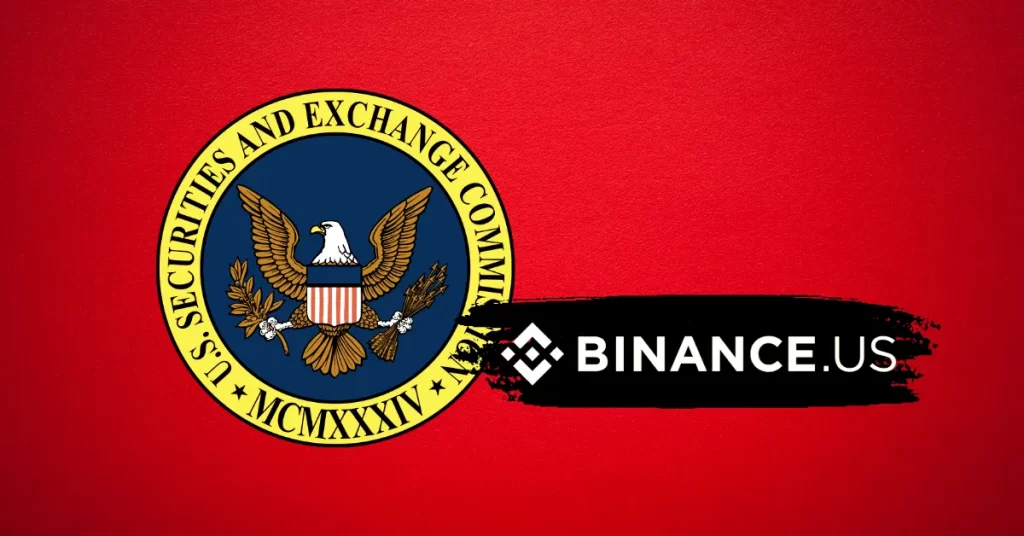Binance’s Strategy Against SEC’s Information Request – Binance vs. SEC Update

The post Binance’s Strategy Against SEC’s Information Request – Binance vs. SEC Update appeared first on Coinpedia Fintech News
In a dramatic turn of events, cryptocurrency exchange giant Binance has filed for a protective court order against the United States Securities and Exchange Commission (SEC). The move is aimed at limiting the SEC’s aggressive discovery efforts, citing concerns of “overly broad†and “unduly burdensome†information requests. This legal battle has caught the attention of the cryptocurrency world and raises questions about the implications for the industry.
The Protective Order Motion:
Binance’s latest motion for a protective order seeks to curtail the SEC’s efforts to obtain extensive information and depositions. This development is Different from the previous actions, including a joint motion filed on September 11, 2023, which aimed to restrict access to sensitive documents classified as “CONFIDENTIAL†or “HIGHLY CONFIDENTIAL – ATTORNEYS’ EYES ONLY.â€
Additionally, an earlier sealed motion from August 28, 2023, and its supporting submissions have added complexity to the unfolding legal drama.
The Dispute:
The dispute between the U.S. SEC and the various entities affiliated with Binance is not uncommon in SEC litigation. The oversight of the case has been assigned to a Magistrate Judge, a standard procedure in such matters.
However, one aspect of the ongoing dispute stands out as rather unusual and even questionable. BAM Trading, the operating company of Binance U.S., along with BAM Management, is seeking to limit the SEC to conducting only four depositions of BAM employees and to drop the deposition requests for six witnesses, including BAM’s CEO Brian Shroder and its CFO, Jasmine Lee.
Unprecedented CEO and CFO Limitations:
The move to limit depositions of BAM’s CEO and CFO is raising eyebrows, as it appears to be an extraordinary step.
John Reed Stark, drawing on his extensive experience at the SEC, including 11 years as the head of the SEC’s Office of Internet Enforcement and his knowledge of securities law, cannot remember a single instance where a court declined the SEC’s request to interview a CEO or CFO, especially when dealing with a temporary restraining order (TRO) and consent order.
Adding an intriguing twist to the situation, Brian Shroder, BAM’s President and CEO, reportedly resigned on the same day that Binance’s legal team filed a motion opposing the SEC’s deposition request. This timing has led to speculation and questions about potential connections between Shroder’s departure and the legal battle.
Management Changes at Binance U.S.:
Following Shroder’s departure, Norman Reed, Binance U.S.’s chief legal officer, is taking over his role. This transition coincides with reports of Binance U.S. conducting layoffs, affecting over 100 positions, which accounts for one-third of its workforce. Binance attributed these layoffs to the SEC’s actions, claiming they have had a detrimental impact on American jobs and innovation.
Whistleblower Opportunities:
Despite Binance’s allegations that the SEC is responsible for its current troubles, Shroder’s departure presents an opportunity for the U.S. SEC and the U.S. Department of Justice (DOJ) to secure his cooperation, especially if he has concerns about potential criminal prosecution or is disgruntled.
The situation may also create challenges for the U.S. SEC regarding attorney-client privilege, given that Norman Reed previously served as an internal legal officer for Binance.
Moreover, the 100 employees laid off by Binance may provide ample material for cooperation agreements, grand jury testimony, and confidential information sharing. This development raises the specter of potential whistleblower claims against Binance, which could lead to substantial financial rewards for those involved.
The clash between Binance and the U.S. SEC is sending shockwaves through the cryptocurrency industry. As legal battles intensify and management changes unfold, the implications for Binance and the broader crypto ecosystem remain uncertain. The outcome of this confrontation may set significant precedents for the future regulation of cryptocurrencies in the United States and around the world. In the cryptoverse, where chaos and confusion often reign, this legal showdown is certainly a situation worth monitoring closely.